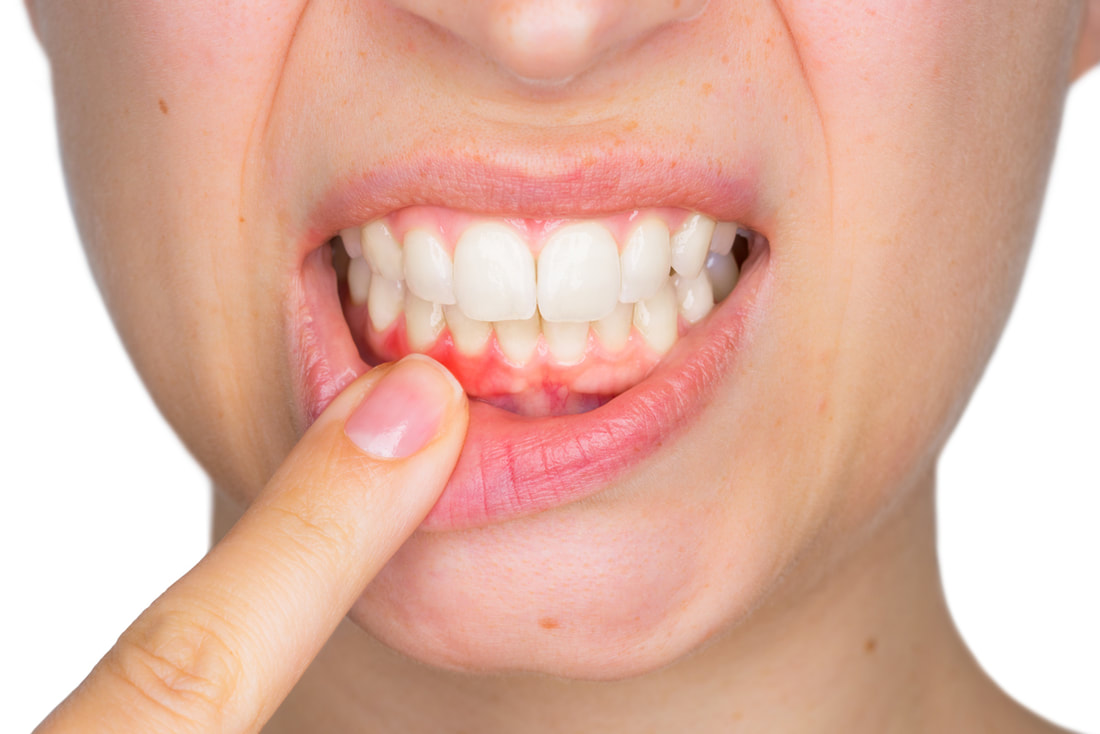If left to fester and worsen, gum disease will eventually lead to extensive loss of gum tissue, tooth loss, deterioration of bone tissue in the jawbone, and the spread of infection and inflammation to other parts of the body.
Clearly, preventing and treating periodontitis (and all forms and stages of gum disease) should be a top dental concern for all of us.
Recognizing The Signs Of Gingivitis
Maintaining good oral hygiene from day to day, eating healthy, vitamin-rich foods, drinking plenty of water on a regular basis, and avoiding tobacco products and excessive consumption of alcoholic beverages will all reduce the risk of developing gum disease.
But even those most diligent to prevent gum disease may be susceptible to it due to genetic factors, high stress levels, imbalanced hormones, or the use of certain prescription medications.
How do you know if you have or are currently developing gingivitis, the mildest form of gum disease? Here are some symptoms to watch for:
- Gums that bleed easily when brushing, flossing, or eating.
- Soreness of the gums. Or gums that are inflamed and/or reddened.
- A receding gum line, along with a pulling away of the gums from the tooth roots.
- Your gum tissue is itchy or feels uncomfortable.
- Teeth are hyper-sensitive to hot/cold, in part because tooth roots have become more exposed.
Getting a regular dental checkup and teeth cleaning twice annually, as recommended by the American Dental Association will help you catch gum disease in the early gingival stage when it can be more easily treated.
Getting up-to-date periodontal treatment earlier rather than later can save your teeth and minimize the extent and expense of treatment.
Understanding The Dangers Of Periodontitis
Without proper prevention and/or periodontal treatment, gingivitis (bad enough) will advance into periodontitis (even worse).
As plaque builds up more and more, a bacteria-infested film continually covers your gums. Toxins released by the bacteria produce inflammation of the gums (and sometimes in other parts of the body as well).
Gum tissue pulls further away from the teeth, creating “pockets” that fill in with bacteria. These infected “deep periodontal pockets” are painful, spread disease to other parts of the mouth and beyond, and destroy gum, tooth, and bone tissue as they fester and grow.
Ultimately, periodontitis can lead to teeth loosening and falling out – or getting so decayed that they need to be extracted.
There are 4 main types of periodontitis:
- Chronic periodontitis occurs very gradually over a long period of time.
- Aggressive periodontitis, which progresses rapidly and may occur as intermittent outbursts in someone who otherwise has a chronic condition.
- Systemic periodontitis occurs as a result of other chronic, systemic health conditions like diabetes, heart disease, or certain respiratory problems.
- Necrotizing periodontitis, which involves lesions in the gum tissue caused by other underlying conditions such as HIV or malnutrition.
There are numerous options available today to treat periodontal disease, including periodontitis, but far better if you can prevent gum disease entirely or at least catch it in its earlier stages.
To learn more about periodontal treatment and prevention of gum disease, contact periodontist Dr. Raymond A. Kenzik in Ormond Beach, FL, today!

